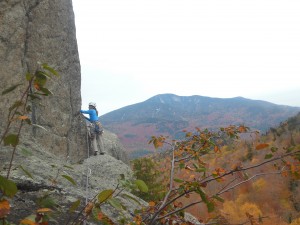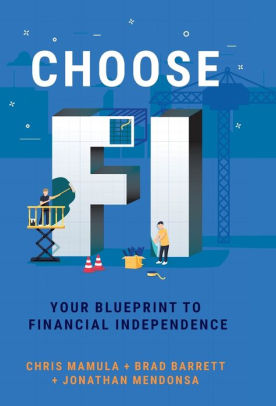Early Retirement? That Sounds Risky!
Ability to assess risk can be the difference between living life to its fullest or being paralyzed by fear. Most people assess risk based on their own personal fears. They tend to look at risk as black and white. One option is the safe option and one is the risky option. Society has a big effect on what is seen as risky and what is safe. Few people look at the price that is paid for choosing the safe option. We count ourselves among those who struggle with these ways of thinking.
Risk assessment is a skill that like any other is honed with practice. Every option carries risks. We must figure out what things we are not willing to lose and manage the risk in those situations. Choosing to take the “safe” route can guarantee that you will limit the opportunities available to you. Let’s look at a few examples.
We love rock and mountain climbing. Relatively few people climb. The consequences of an accident can be extreme including severe injury or death. Based on that surface level assessment, these activities must be risky. They should be avoided. End of story.

Let’s look a bit deeper. What if we just stopped climbing or never started. We would lose an activity that we share, find incredibly rewarding and challenging. We would not have had many of our best memories and experiences. We would not have many amazing friends with whom we share this activity. We would not have a side job teaching climbing to beginners. This job is fun and rewarding and will be the primary way that we will be able to fund our daughter’s college education, without taking away from our early retirement resources. Not climbing (playing it safe) would mean we would lose all of these positive things. The losses would be guaranteed.
This doesn’t mean that there is no risk in climbing or that those risks should be underestimated. It means that we have looked at the full picture, have figured ways to limit risks and have decided that the rewards outweigh the risks for us.
Another example from my life is my unwillingness to pursue entrepreneurship. I witnessed how hard my parents worked starting up and running a small business. That option seemed much more risky for me than working for someone else. Starting my own business meant risking failure. I could also make it, but sacrifice several years of my youth doing so. You don’t start with three weeks of paid vacation when building a small business.
Being employed was the “safe” decision. I had little risk to ever losing my job, I had cushy benefits including generous salary, benefits and vacation time. What I am now realizing is that I worked very hard anyway to help build two different practices for others. I’ve given myself no real option to continue making money in my current field but to continue to be paid for providing services. Starting my own business would have given me the option to leverage other people’s time and skills. While there were certainly benefits to the path I chose, I guaranteed myself failure in having an option to generate passive income in early retirement when I chose the “safe” choice. At the same time I capped my own earning power to what someone else felt I was worth while also passing up on significant tax advantages of business ownership. I don’t know which path that I would choose if I had to do it again. I do know that I would view the opportunities differently with the benefit of hindsight. I realize that the “safe” option came with its own costs.
This brings us to our current situation, preparing for early retirement. When we talk to people about our plans, most immediately ask the same questions. How can you make your money last that long? How will you afford health insurance? These are legitimate concerns and demand serious thought and planning. However, they should not cause fear that prevents action. That would be a product of thinking like most and failing to assess the risk of the other path, spending your whole life working.
I wrote in the very first post on this blog my reasons for continuing to work full-time. However, we continue to develop our plans and assess the risk of our different options. Choosing to continue to work full-time certainly gives us more financial security in the short run. It guarantees us to not have the hassle of figuring out health insurance while Obamacare works itself out in the legal and political systems. It allows us an acceptable, if at times overly busy and stressful lifestyle. However, in choosing to devote 50 hours/week to work, I am guaranteeing myself that I will have to sacrifice in other areas that are important to me. I am guaranteed to spend less time than I would like with my daughter as she quickly grows and changes. I am guaranteed to have only one chance at each different phase in her life, and I watch how quickly they pass by. We are guaranteed to spend less time than we would like pursuing our hobbies. We are not guaranteed to continue to have the health to pursue these activities together as we get older. Our time constraints guarantee us to see less than optimal progress on developing secondary income strategies that will help support us in early retirement. While others may consider early retirement very risky, continuing on the “safe” path seems pretty risky to me.
Think about how you are assessing risk. Are you looking at the big picture or only the short-term? Are you thinking for yourself or just following the conventional path? Are you accurately assessing risk or acting on fear? Are you consistently making “safe” choices that are guaranteeing failure in other areas of life? Are you taking on too much risk and leaving yourself vulnerable? Only you can answer these questions. It is pretty risky not to do so correctly!
*Thanks for reading. If you enjoyed this content, you can find my current writing at Can I Retire Yet?. Enter your email below to join our mailing list and be alerted when new content is published.

Top recommendations
Hi EE, thanks for another great post!
I can’t agree with you more. “Safe” options bear their own risks. Bank deposits and Treasury fund are depicted as risk-less investments, as long as they cover inflation. However, the risk of losing on opportunities because of dedication to those “risk-less” options can be greater.
It is all about perspective. No choice in life is without risks and benefits. Every decision we make has consequences.